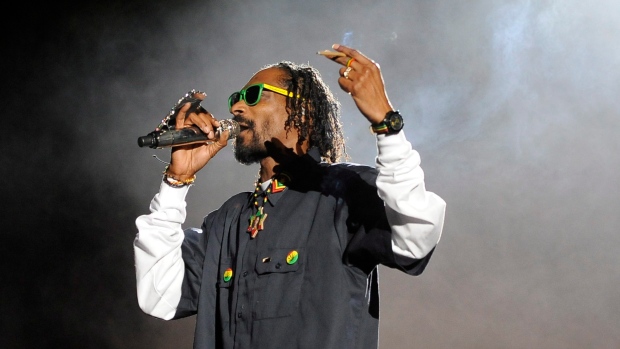Apr 21, 2017
Why Snoop Dogg won’t be the face of legalized cannabis in Canada

Snoop Dogg will not be smoking any joints on Canadian television screens anytime soon.
Ottawa is imposing tight restrictions on how cannabis can be promoted once the drug becomes legal for recreational use next year, including a ban on celebrity endorsements. Yet even while most of the specific regulations around marijuana marketing remain under development, Canada’s largest legal cannabis producer and a growing chorus of branding experts are gearing up to get in on the coming cannabis advertising boom.
“The branding of the product rather than the experience, we would love to be able to put that everywhere,” Bruce Linton, CEO of Tweed Marijuana parent Canopy Growth, told BNN via telephone this week. “That is because we are trying to migrate people away from the black market or distilled spirits.”
“Anywhere you see a distilled spirit being positioned, we would like to be there as well,” Linton said.
Canopy, the first publicly-traded Canadian cannabis producer to surpass $1 billion in market value, currently employs a dozen people full-time in branding and social communications. Linton stressed the department is not a “marketing” team since that is not yet allowed under Canadian law. Regardless of what the team itself is called, Linton plans to double its size over the next year.
“You are going to start to see brand building,” Baron Manett, president of Toronto-based Per Se Brand Experience, told BNN via telephone. “Already in Colorado they are seeing a boom in marketing service companies [so not only] the owners of the brands but there is opportunity for the ad agencies, PR firms, production companies, media planning, media buying; all the ways of identifying the core markets or audiences that the brand wants to reach.”
“I think the proxy for what we will be probably see in Canada is what we are seeing in Colorado now,” Manett said.
According to Manett and Linton, initial advertisements are likely to be very straightforward displays of information such as strain, strength and other basic product details. Despite Canopy having made a branding agreement with self-avowed cannabis connoisseur Snoop Dogg last October – including throwing a lavish birthday party for the west coast rapper “and a thousand of his closest Tweed friends” – Linton acknowledged the agreement was more of a “hedge” than the start of a marketing strategy.
While most of the regulatory details – beyond widely expected restrictions on appealing to youth including a ban on using mascot-like characters and celebrity endorsements – are still being ironed out, Canopy’s Linton has a pretty clear idea of what will be allowed.
“What is going to be permitted, expected and required is for people to be able to distinguish things and a much stronger focus on education,” Linton said. “It is both good citizenship and good business if people consume responsibly, because if someone overconsumes in their initial trial they are unlikely to be a repeat customer.”
The focus on education in the early days of legal cannabis promotion means the best creative may still be years off, John Yorke, president of Toronto-based marketing firm Rain43, told BNN via telephone this week.
“On the actual creative expression, I think you are going to see very generic but hard-hitting work,” Yorke said. “I think good creative will come later.”
Clever ways around the proposed restrictions on cannabis promotion are possible. One of the earliest legal marijuana advertisements in the United States – from early 2014 – managed to successfully pitch the project without ever showing or mentioning cannabis directly. Yet with marijuana marketing still unchartered territory in Canada and in the vast majority of the developed world, Yorke points out the bar will be set fairly low at the start.
“If the ad just said marijuana with brand ‘x’ or a pot leaf with brand ‘x’, I think people are just going to be surprised to see that,” Yorke said. “Whoever is going to get that will get their reach out early.”
With the federal government targeting a fully functional recreational cannabis market in Canada by July 2018, producers are already moving to claim a loyal base of customers.
“The people I’ve been meeting with, there is now an open conversation about how to market [cannabis] as a consumer product,” said Per Se’s Manett. “The conversation hasn’t just started, but it is starting to heat up.”



